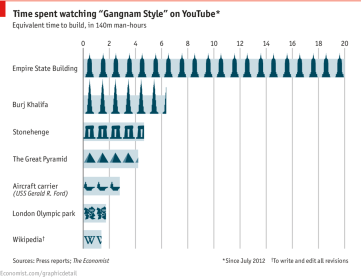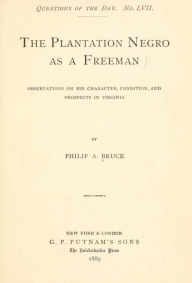This summary also appeared on the ever-interesting blog of one of our sponsors, the Oxford Centre for Life-Writing.
Procrastination: Cultural Explorations
2 July 2014
Wolfson College, Oxford
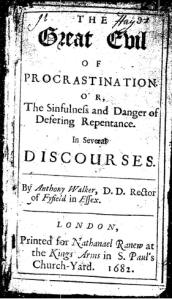
Frontispiece of Anthony Walker’s The Great Evil of Procrastination (1682)
Thomas de Quincey claimed it was worse than murder. Krishna declared it a sign of a degenerate soul. For Abraham Lincoln’s wife it was her ‘evil genius’. Estimates suggest that 80-95% of college students engage in it, and 20% of people are chronic sufferers. Even the Ancient Egyptians bitched about it in hieroglyphics.
Lollygagging, swithering, dithering, dillydallying, shillyshallying. Procrastination is ubiquitous—perhaps especially among academics and writers. Yet it remains curiously understudied. It is a dirty word.
One balmy July morning at the very unprocrastinatory hour of 8.30am, we set about rectifying the deficit. A host of bleary-eyed scholars, students, journalists and miscellaneous others straggled in with a variety of excuses. Our favourite: ‘Sorry, I accidentally came yesterday.’
A mere two months later, we’ve finally got around to summarizing the day.
The economic approach
Though the humanities haven’t got round to saying much about procrastination, other disciplines have. Economic historian Avner Offer opened by summarizing the state of the field. Rational choice theory can tell us how long we ought to delay. Behavioural economics can explain why we delay. But the humanities can tell us what procrastination feels like: ‘indecision is destiny’. As one participant later suggested, it is only through such cultural explorations—from Hamlet to Homer—that we can understand ‘the phenomenology of procrastination’ in all its richness.

Homer Simpson, icon of immediate gratification
Avner concluded with some helpful advice about being more decisive. When to stop dating and put a ring on it? The optimal number of prospective mates to ‘sample’ is 37 (!!!)—or if you have lower standards, 12.
Procrastination, creativity, and form
Albert Einstein famously played the violin, while Keith Vaughan, mid-century British painter, prolific diarist and the subject of Alex Belsey’s presentation, was a prolific masturbator. The first panel tackled the fraught relationship between procrastination and creativity, the spectrum between Einstein’s creative ‘play’ and Vaughan’s self-loathing. Will May discussed poetry as product of and prompter toward procrastination, part of his broader project on the cultural history of poetry and whimsy. Rebecca Birrell later expanded this theme, with a sensitive exploration of contemporary poets Rachael Allen and Sam Riviere.
In his paper on The Tempest, Johannes Schlegel explored the possibility that procrastination describes the theatre, where the deceleration of real time to absorb theatrical time creates a meaningful stasis. Conversely, the modernist novel captures the flux of capital and commodity culture, argued Oliver Neto. Stephen Daedalus’s flânerie and the hybrid prose-poetry of Ulysses together evoke the widespread boredom of capitalist Dublin.
Resisting demonization
Ulysses thus offered an emancipatory opening in the face of colonialism and alienation. Later speakers took up this theme: the revalorization of procrastination as possibly positive.
Papers by Lilith Dornhuber de Bellesiles and Mrinalini Greedharry presented alternative subjectivities of procrastination. Lilith offered a theoretically robust ‘queering’ of mainstream conceptions of time, while Mrinalini considered procrastination as ‘an epistemological condition situated somewhere between awareness, habit, and unknowing’. Reading together postcolonial theory with Ann Cvetkovich’s Depression: A Public Feeling, she called for alternative—and more humble—forms of knowledge.
Two papers on francophone authors, by Anna Della Subin and Kamel Boudjemil, opened up more revolutionary alternatives. If procrastination depends on internalizing clock time, Anna Della argued, the debonair Egyptian novelist Albert Cossery lived and wrote a radical idleness entirely outside this model. The Marxist theorist Guy Debord chalked Ne travaillez jamais on a Parisian wall, Kamel noted; the booze-fuelled wanderings of his Situationist International attempted to subvert not only the notion of work but the bourgeois city itself.
Historically specific or human universal?
This raises the question of whether procrastination is a universal—all those hieroglyphic rebukes—or whether it is inextricably linked to a very specific ‘modernity’. Is procrastination a product of factory time and the Protestant work ethic, spread about the world via colonialism and the inexorable spread of capitalism?
Our speakers broadly agreed that perceptions and manifestations of procrastination are historically variable and culturally conditioned, from James Joyce’s Dublin to Cossery’s Egypt and the contested coffee houses of early-twentieth-century Baghdad (Pelle Valentin Olsen). Susanne Bayerlipp even uncovered procrastination in early modern letters. Young English travellers in Italy were chastised by their elders for sidelining their academic pursuits in favour of pleasure. The Erasmus program, she seemed to suggest, is named for the humanist scholar with good reason.
Self-Help

Samuel Smiles’ Victorian bestseller, Self-Help (1859)
Nowhere is this cultural contingency more apparent than in the flowering of self-help literature, explored by our three final speakers. Susan Machum provided a devastating summary of the endless lists of advice in twenty contemporary self-help books, noting the message of individual responsibility they propagate. In contrast to the fluffiness of this literature, Barbara Leckie offered a witty reading of Middlemarch as an exploration of procrastination—with Casaubon as the everyman academic.
The closing keynote, by OCLW visiting scholar Tracey Potts, presented a genealogy of procrastination. The work forms part of Tracey’s Leverhulme-funded research project for her forthcoming book, Neither Use Nor Ornament: Friction and Flow in the Information Age.
Tracey argued that the demonization of procrastination is a form of biopower, achieved through the factory, the military, and the clinic. Attendees were alarmed to hear that ‘procrastination’ appeared (alongside ‘pouting’ and ‘stubbornness’) in the American Psychiatric Association’s 1952 Diagnostic and Statistical Manual of Mental Disorders (DSM)—as a direct import from the US military.
Swiftly procrastination became reconfigured not as a behaviour, but as a symptom of a pathological personality. This theme is continued in contemporary self-help books, more and more colonized by cod-neurobiology.
Tracey concluded the conference with a rousing call to resist moralization and medicalization. ‘The maths simply doesn’t stack up,’ she argued. Not all causes of delay are down to individuals ‘choosing’ failure. And, following Zygmunt Bauman, ‘indolent people are only a problem in a society of producers.’
Mañanarama
After a stimulating communal discussion—covering everything from zero-hours contracts to the masochistic writers’ aid Write or Die—participants headed to the Mañanarama exhibition for some much-needed drinks.

Walter Benjamin biscuit cutter, from the personal collection of Tracey Potts
The exhibition displayed a host of procrastinatory artefacts, including an Ostrich pillow, a 91-year-old magazine advertising wacky invention ‘The Sleep Eliminator’, original documents from the Situationist International, and Tracey’s very own Walter Benjamin biscuit cutter—made, of course, while avoiding work.
The Cunctator Prize for the best graduate paper (sponsored by the Isaiah Berlin Literary Trust) was awarded to Frank Hangler of the Oxford Internet Institute. His lively paper, ‘Cutting the Cord’, assessed technology as both the source of and solution to procrastination.
You can see the full paper, along with other exhibits, here.
Questions left to ponder
After the conference we were still left wondering: what exactly is procrastination? If we’re not happy with the economists’ model, how can we begin to define it? What is its relationship with cousin concepts, like idleness and boredom?
More terrifying was the realisation that maybe we academics are the peculiar ones. As Jane Shilling summarized for The Telegraph:
It was during a paper on Procrastinating Abroad that the God in the machine made an unexpected appearance. We were considering Hieronymus Turler’s 1585 warning to the concerned relations of 16th-century gap-year travellers: (‘Three things come out of Italy: a naughty conscience, an empty purse and a weak stomach’) when from somewhere in the roof came the clarion sound of a duo of distinctly unacademic voices engaged in an animated discussion of air vents. Above the sussuration of ruffled scholarly feathers, a quick-witted attendee remarked, ‘I hate to tell you, but they’re probably working!’
Interested? We’ll be debating all these questions and more next term at the Procrastination Seminar, on Wednesdays at 5.30pm at All Souls College.
Further details…are coming soon.
The Procrastination: Cultural Explorations conference was generously supported by OCLW, TORCH (The Oxford Research Centre in the Humanities), and All Souls College.
Like this:
Like Loading...
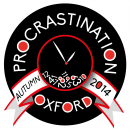

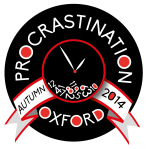


 29 October: John McManus,
29 October: John McManus,  Tamara Spitzer-Hobeika,
Tamara Spitzer-Hobeika, 






